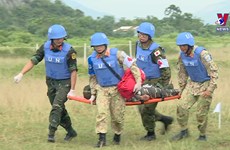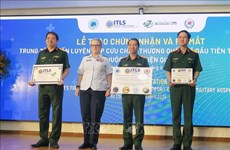Vietnam calls for more Japan’s aid to health sector
Vietnam’s minister of health has called on the Japanese government to
continue to give priority to health cooperation in its policy on
Official Development Assistance (ODA) for Vietnam.
Vietnam’s minister of health has called on the Japanese government to
continue to give priority to health cooperation in its policy on
Official Development Assistance (ODA) for Vietnam.
Minister of Health Nguyen Thi Kim Tien made the call at a forum to mark 40 years of bilateral cooperation between Vietnam and Japan in the health sector on May 15 in Hanoi.
At the event, held by the ministry in partnership with the Japanese embassy in Vietnam and the Japan International Cooperation Agency, Minister Tien also suggested that Japanese investors consider the construction of hospitals and the production of high-quality medical equipment and pharmaceuticals in Vietnam .
She emphasised that Japan is currently one of the largest bilateral ODA providers for Vietnam in general and in the health sector in particular. Japanese-funded projects have helped improved the sector’s infrastructure as well as its diagnosis and treatment capacity.
Tsuno Motonori – JICA Chief Representative in Vietnam – said that his agency hopes to maintain and further build on the fruitful results of bilateral cooperation in this field, adding that investment in health care means investment for the future.
On this occasion, the health ministry presented an insignia “For People’s Health” to the JICA chief.
Bilateral cooperation in health care started with the project to build Cho Ray Hospital in Ho Chi Minh City using non-refundable aid. After Japan officially resumed ODA provision for Vietnam in 1992, health care has always been a high priority in bilateral ties. The period from 1993 to 2008 saw a series of large-scale non-refundable aid projects to supply medical equipment to hospitals in Hanoi and vaccines to Vietnam’s national expanded vaccination programme. Major hospitals nationwide including Bach Mai in Hanoi, Hue in the central province of Thua Thien-Hue and Cho Ray in HCM City have also received Japanese aid to upgrade infrastructure.
In addition, JICA has paid special attention to help Vietnam in human resources training and producing medicine. In 2006, the Japanese government helped Vietnam build a factory producing measles vaccine, the most modern facility in Southeast Asia and transferred the technology to make measles vaccine to Vietnam in 2009.
The two sides will begin a project on transfer technology to manufacture measles-rubella vaccines to Vietnam at the end of this month, with the goal of putting made-in-Vietnam vaccine on the market by 2018.
JICA has also conducted several projects in the field involving enhancing the capacity of the laboratory system, improving rehabilitation services for people with disabilities and caring for mother and infant health.-VNA
Minister of Health Nguyen Thi Kim Tien made the call at a forum to mark 40 years of bilateral cooperation between Vietnam and Japan in the health sector on May 15 in Hanoi.
At the event, held by the ministry in partnership with the Japanese embassy in Vietnam and the Japan International Cooperation Agency, Minister Tien also suggested that Japanese investors consider the construction of hospitals and the production of high-quality medical equipment and pharmaceuticals in Vietnam .
She emphasised that Japan is currently one of the largest bilateral ODA providers for Vietnam in general and in the health sector in particular. Japanese-funded projects have helped improved the sector’s infrastructure as well as its diagnosis and treatment capacity.
Tsuno Motonori – JICA Chief Representative in Vietnam – said that his agency hopes to maintain and further build on the fruitful results of bilateral cooperation in this field, adding that investment in health care means investment for the future.
On this occasion, the health ministry presented an insignia “For People’s Health” to the JICA chief.
Bilateral cooperation in health care started with the project to build Cho Ray Hospital in Ho Chi Minh City using non-refundable aid. After Japan officially resumed ODA provision for Vietnam in 1992, health care has always been a high priority in bilateral ties. The period from 1993 to 2008 saw a series of large-scale non-refundable aid projects to supply medical equipment to hospitals in Hanoi and vaccines to Vietnam’s national expanded vaccination programme. Major hospitals nationwide including Bach Mai in Hanoi, Hue in the central province of Thua Thien-Hue and Cho Ray in HCM City have also received Japanese aid to upgrade infrastructure.
In addition, JICA has paid special attention to help Vietnam in human resources training and producing medicine. In 2006, the Japanese government helped Vietnam build a factory producing measles vaccine, the most modern facility in Southeast Asia and transferred the technology to make measles vaccine to Vietnam in 2009.
The two sides will begin a project on transfer technology to manufacture measles-rubella vaccines to Vietnam at the end of this month, with the goal of putting made-in-Vietnam vaccine on the market by 2018.
JICA has also conducted several projects in the field involving enhancing the capacity of the laboratory system, improving rehabilitation services for people with disabilities and caring for mother and infant health.-VNA













